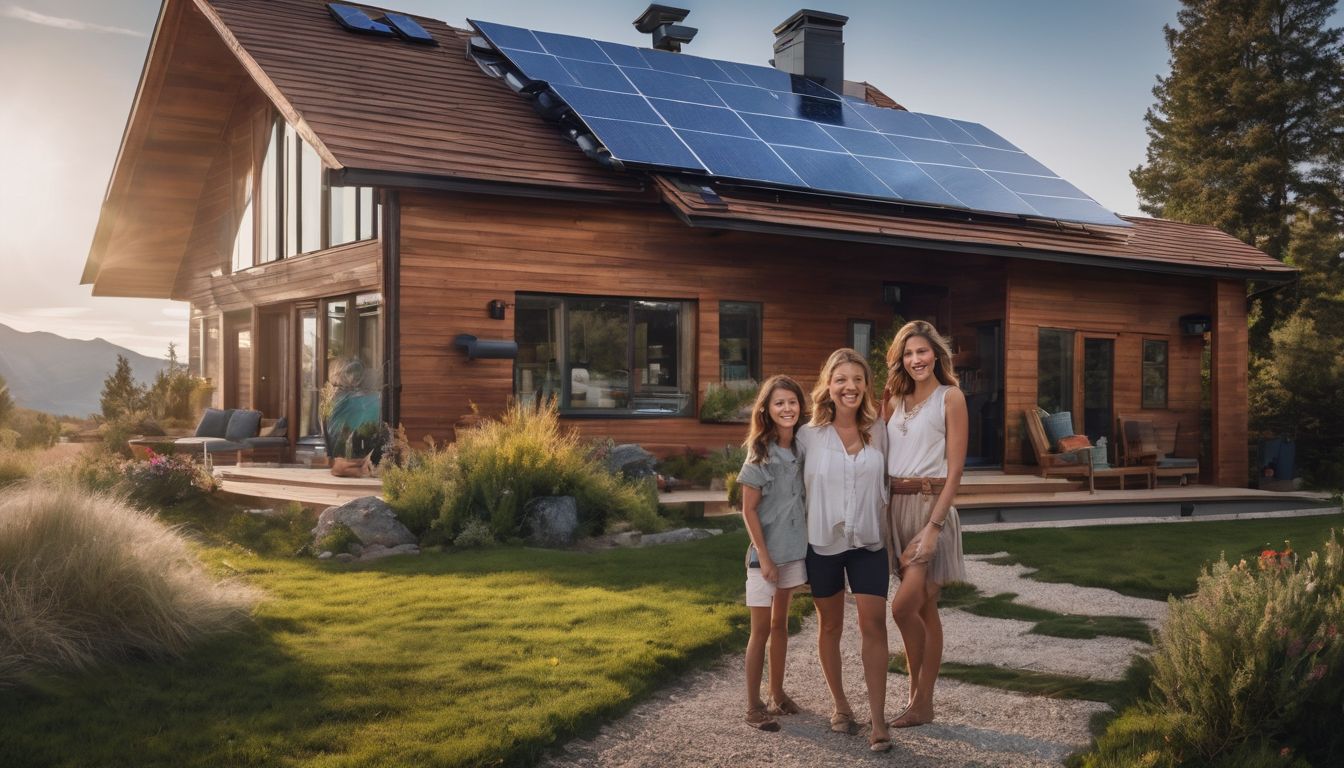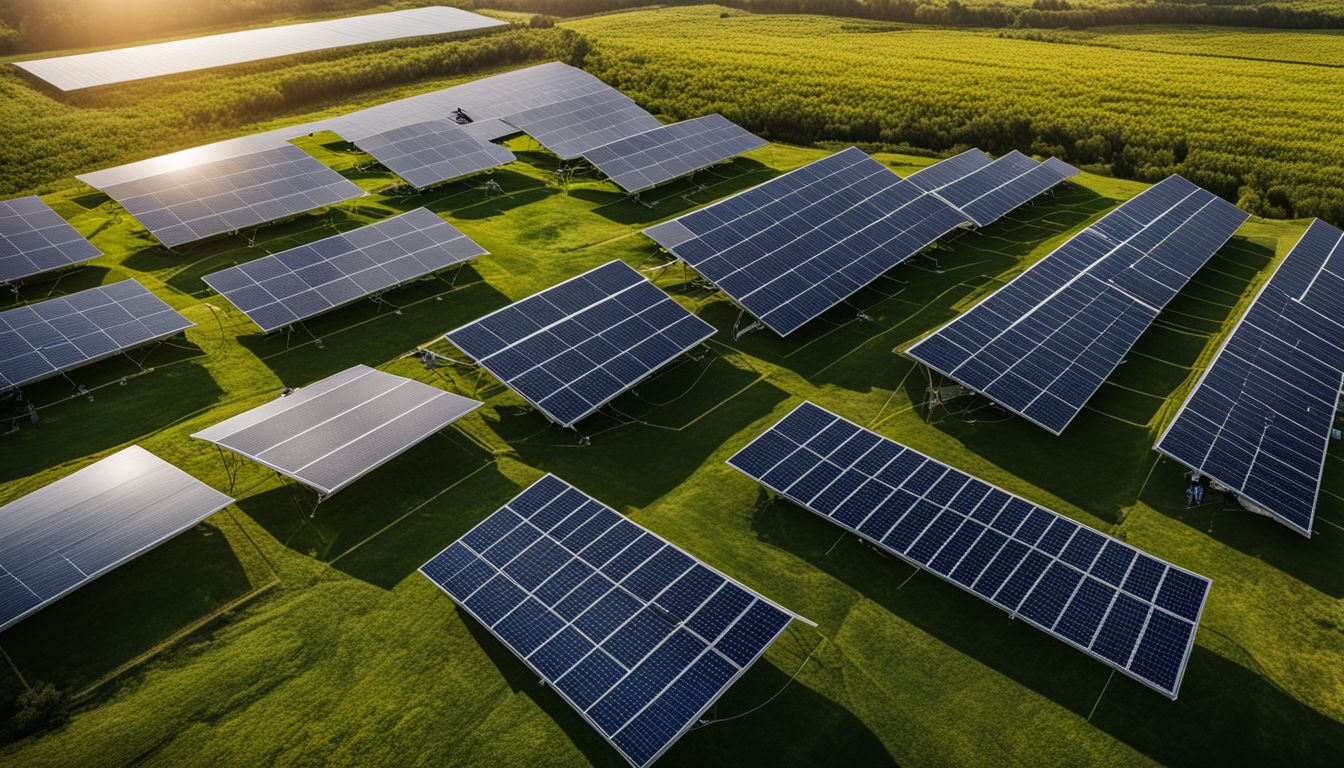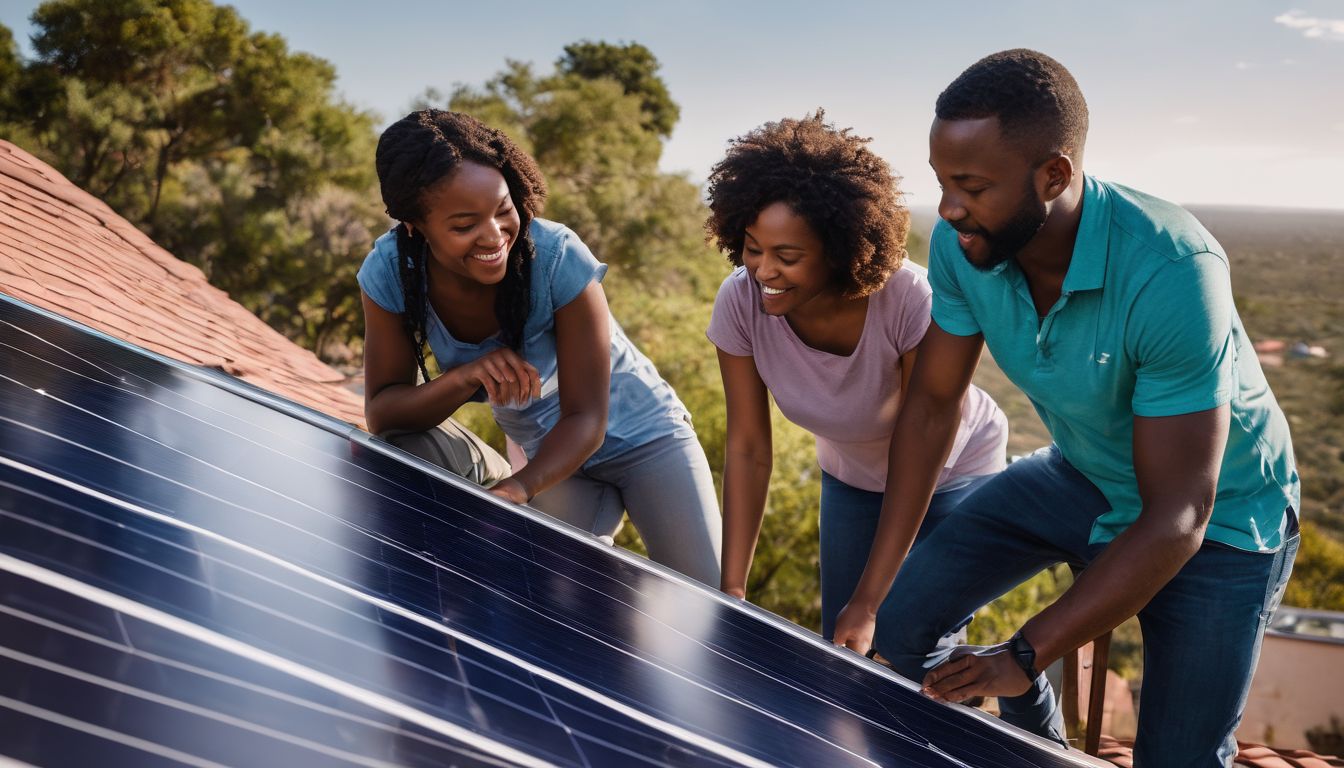How many solar panels does it take to power a house in South Africa?

As South Africans seek to reduce their electricity bills, interest in solar energy is soaring. Did you know an average home may need up to fourteen solar panels? Our guide will break down the essentials, helping you determine just how many panels your home might require.
Read on for enlightenment!
Key Takeaways
- The average South African home might need between six and fourteen 455W solar panels, while bigger houses could require up to twenty-three.
- Solar panel choices include monocrystalline, which has higher efficiency and a higher cost, or polycrystalline, which is more budget-friendly but less efficient.
- Factors that affect how many solar panels you need include daily energy use, peak sun hours in your area, and whether anything like trees or buildings shades your roof.
- Solar panels can last for about 20 to 30 years, and sometimes even longer with good care.
- The cost of setting up a solar system in South Africa can range from R150,000 to R350,000 for installation, including the price of the panels.
Understanding Solar Panels

Solar panels, also known as photovoltaic (PV) panels, convert sunlight into electricity using an array of solar cells. These cells can be made from either monocrystalline or polycrystalline silicon, each with their own benefits and drawbacks.
https://www.youtube.com/watch?v=bzcTFUcXwIY
Photovoltaic Power
Photovoltaic panels turn sunlight into electricity. These panels have solar cells that capture light and make direct current (DC) power. Homes in South Africa can use this kind of energy to run lights, appliances, and other things they need every day.
A sunny country like South Africa has a big chance to use photovoltaic power. With good sunlight most days, homes here can get lots of power from just a few solar panels. This is great because it means people don't have to rely so much on regular electricity that might not always be there when they need it.
Plus, using the sun's energy helps the environment since it doesn't create any bad waste or gases.
Monocrystalline vs Polycrystalline Solar Panels
Deciding between monocrystalline and polycrystalline solar panels is crucial for homeowners in South Africa considering a shift to solar energy. These two types have distinct characteristics impacting efficiency, cost, and installation space.
| Feature | Monocrystalline Solar Panels | Polycrystalline Solar Panels |
|---|---|---|
| Efficiency | Higher efficiency, making them suitable for limited space | Lower efficiency of around 13–16% |
| Space Efficiency | Require smaller installation areas | Less space-efficient, necessitating larger areas |
| Cost | Generally have a higher price point | More cost-effective compared to monocrystalline panels |
| Appearance | Typically have a uniform black hue | Often have a blue, speckled appearance |
| Longevity | Usually last longer due to high-purity silicon | Slightly shorter lifespan but still offers long-term service |
Monocrystalline panels excel in performance, offering greater efficiency per square metre. These units are ideal for homeowners with limited rooftop space. They harness sunlight more effectively, promising a better return on investment despite their higher initial cost. Polycrystalline options, while less efficient, are preferred by those with ample installation space and a tighter budget. They deliver sustainable energy solutions without breaking the bank. Choosing the right type for your home depends on specific needs, available space, and financial considerations.
Average Energy Consumption in South African Homes

Homes in South Africa use a range of electricity, depending on their size and gadgets. On average, they might need six to fourteen 455W solar panels to meet this power need. Large houses with more rooms and electrical items often want up to 23 panels.
A family usually goes for a 3.1 kW solar system to cut down on their energy bills. This means about eight panels are just right for the job. Every month, homes look at how much kWh they have used to pick the best type of solar setup for their home's power needs.
With good sunshine all year round, giving about 220 W/m2, South Africa is a great place for making energy from the sun. People try to get enough panels to create around 80% of what they normally use from the grid.
https://www.youtube.com/watch?v=4qHxxCsWYWc
Estimating the Number of Solar Panels Needed
To determine the number of solar panels needed for your home in South Africa, you can use your electricity bill to calculate your energy consumption and then factor in the average energy production of a solar panel in that region.
This will give you a rough estimate of how many panels you'll need to power your house.
https://www.youtube.com/watch?v=pCoTa3sg_us
How to Use Your Electricity Bill to Determine Your Solar Needs
- Look for the total kilowatt-hours (kWh) you used over the month. This number is often on the front page.
- See how many kWh you use each day. Divide your monthly usage by 30 (the average number of days in a month).
- Find out when you use the most electricity. Your bill might have charts showing daily or hourly use.
- Check your highest power use in a day, also called peak demand. You need enough solar power to cover this.
- Understand that South Africa has lots of sunlight. With more sun, each panel makes more power.
- Get the number of peak sun hours for your area. This tells you how long your panels can produce their best power each day.
- Use an online solar calculator tool if available. Enter your details, and it will help with the math.
- Know that more efficient panels can give you more power in less space. Think about this if your roof is small.
- Remember, other things can change how much power you get from panels, like shade or roof direction.
How Big of a Solar System Do I Need for My House???
Figuring out the right size for your solar system can be like putting together a puzzle. You need to look at how much electricity you use. The average home in South Africa might have enough with six to fourteen 455W panels.
But if you've got a big house, think about getting up to twenty-three panels. Check your electricity bill to see how many kilowatt-hours (kWh) you use each day.
To make sure you're covered, especially during times when the sun isn't shining brightly, an even bigger system may be better. Some folks go for a 10 kW setup, which is plenty powerful for most homes.
It's also smart to think about any future needs, like if you plan on buying more appliances that use electricity or if load shedding becomes more common. A larger system means less worry about running out of power and more chances of staying charged up every day!
Factors Affecting Solar Power Production
Sunlight is key for solar panels to work well. They need a good spot where nothing blocks the sun from hitting them. In South Africa, it's best if the panels face north. This way, they get the most light and can make more power.
Trees or buildings near your home could cast shadows on your solar panels. Too much shade can lower how much electricity they make. It's not just about where you put them; how you angle them matters too.
They should tilt at an angle that catches the sun's rays perfectly throughout the year. Remember, even dust or leaves on your panels can block sunlight and reduce their power output, so keeping them clean is important!
How long do solar panels last??
Solar panels are tough, and they work for many years. They keep making electricity from sunlight for a long time.
You can expect solar panels to last between 20 and 30 years.
Most home solar systems come with a lifespan of about 25 to 30 years.
With regular cleaning and maintenance, some solar panels can keep going for over 30 or even up to 40 years.
Even when they get older, solar panels don't stop working; they just make a bit less power.
The life of your solar system also depends on the kind of panels you choose; monocrystalline panels tend to last longer than polycrystalline ones.
Using a charge controller helps protect batteries in your system, which extends the overall life of your setup.
Harsh weather can affect how long panels last, but good-quality ones are built to withstand pretty strong conditions like heavy rain and wind.
Cost of Solar Panels in South Africa
It takes about six to fourteen 455W solar panels for an average South African household. For larger homes, up to around 23 panels are needed. The start-up cost for solar panel installation in South Africa can range from R150,000 to R350,000, according to Capitec estimates.
The price of solar panels varies based on brand and size, starting at around R2500 for a 345W monocrystalline solar panel and going up to R4500 for a 540W panel. Additionally, the installation cost ranges from about R70,000 for a small home set-up to R350,000 for a larger one.
The overall cost of setting up a home solar system in South Africa typically falls within the range of R10,000 to R25,000, depending on the scale and any extra components required.
Choosing the Right Solar System for Your Home
Considerations for first-time buyers, such as budget and energy needs, are crucial in choosing the right solar system. Sizing your solar system correctly and exploring the potential for a hybrid system should also be taken into account to ensure maximum efficiency and cost-effectiveness.
Considerations for First-Time Buyers
When considering solar panels for the first time, it's essential to assess your energy needs and consumption. Understanding how much electricity your household uses daily will help in determining the right size of a solar system.
It's also crucial to factor in the cost of installing solar panels as well as consider more efficient options that could save you money in the long run.
Moreover, exploring different types of solar panels, such as monocrystalline and polycrystalline, can provide insights into their efficiency and durability. This information empowers first-time buyers to make informed decisions that align with their budget and energy goals while ensuring they get an effective system that meets their requirements without overspending or sacrificing reliability.
Sizing Your Solar System
To size your solar system for your home in South Africa, follow these steps:
- Calculate Your Daily kWh Energy Requirement: Determine how much electricity your household uses in a day.
- Divide by Peak Sun Hours: Divide your daily energy requirement by the peak sun hours to get the kW output needed from your solar panels.
- Use an Online Solar Calculator: Make use of an online solar calculator to estimate the size and cost of a renewable energy system that suits your specific requirements.
- Consider Household Energy Consumption: Take into account the energy consumption patterns of your household when deciding on the number of solar panels needed.
- Consult a Solar System Size Calculator: Utilize a solar system size calculator to assist in determining the appropriate size of the solar system for your home or business.
- Evaluate Panel Efficiency and Energy Output: Consider the efficiency of the solar panels and evaluate their energy output to choose the right solar system for your home in South Africa.
Potential for a Hybrid System
A hybrid system, comprising 8 solar panels and 2 batteries in South Africa, comes with an estimated cost ranging from R115,000 to R120,000. It is crucial to consider the various types of solar systems available, such as grid-tied, off-grid, and hybrid options.
Each type presents its own unique benefits and considerations that should align with the specific energy needs and circumstances of a household.
By analysing the energy consumption patterns and requirements of your home through methods like using your electricity bill or determining the necessary size of a solar system for your house, you can effectively assess whether a hybrid system suits your needs.
Conclusion
In conclusion, determining the number of solar panels needed for a South African home relies on several factors: energy consumption, panel efficiency, and location. Understanding these variables helps ensure an accurately sized solar system that meets the household's energy needs.
With careful consideration and assessment, households can harness the power of solar energy to reduce their dependence on traditional grid electricity while contributing to a sustainable future.
By embracing solar power technology, South African homeowners can make meaningful strides towards energy independence and environmental stewardship.
FAQs
1. How many solar panels are needed to power a typical house in South Africa?
It depends on the house's electricity consumption and radiation levels, but you'll likely need a considerable number of photovoltaic solar panels as part of your PV system.
2. What factors affect how many solar panels I will need?
Key factors include your home's energy use, available roof space, the efficiency of the solar PV system, and sunlight hours in your area. The battery pack type—like lead-acid or lithium-ion batteries—also plays a role due to different charging times.
3. Can environmental conditions impact my solar power generation?
Absolutely! In South Africa, where sunshine is abundant, radiation levels can boost your photovoltaic power potential—but remember that concentrated solar heat may require cooling strategies for optimal performance.
4. Do I need other components besides solar panels for my home's energy needs?
Yes, you will also require an appropriate-sized battery charger like MPPTs (Maximum Power Point Tracking), a reliable charge controller to manage energy flow—a crucial part if using storage options like gel batteries or Lifepo4—and possibly an inverter for converting generated electricity to usable power.
5. Are there financial benefits to installing a photovoltaic (PV) system at home?
Certainly—the long-term savings on electricity bills speak volumes! Plus, you might be eligible for tax deductions like capital allowances and depreciation expenses because eco-friendly systems like solar PV qualify for incentives designed by companies income tax guidelines.
6. Besides powering my appliances, what other uses does residential solar electricity have?
You can use it for heating water—thus reducing gas usage too—or potentially earn credits from excess energy fed back into the grid connection under certain schemes; leveraging every bit of your kilowatt peak capacity could mean more bang for each ray of sunshine!











